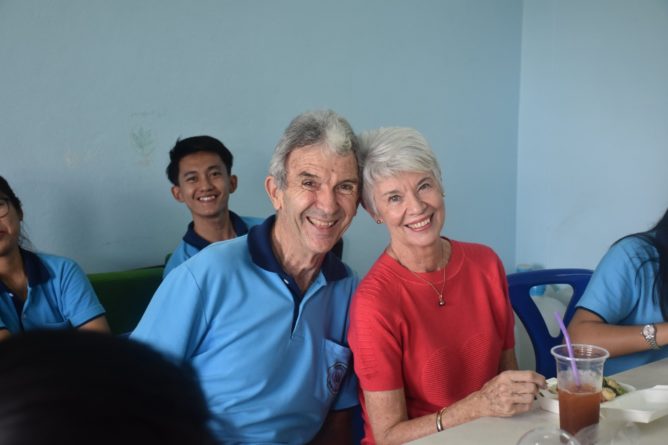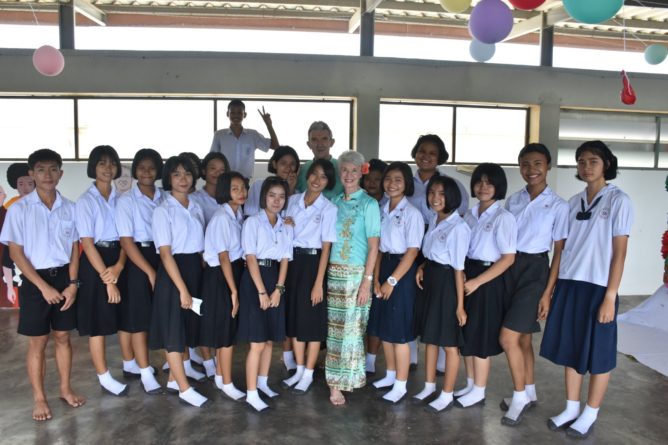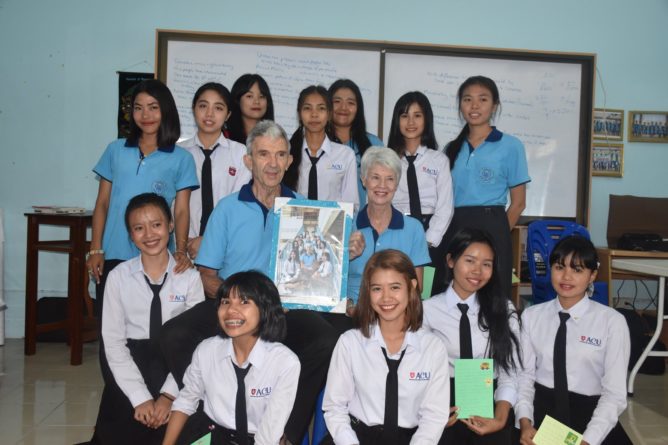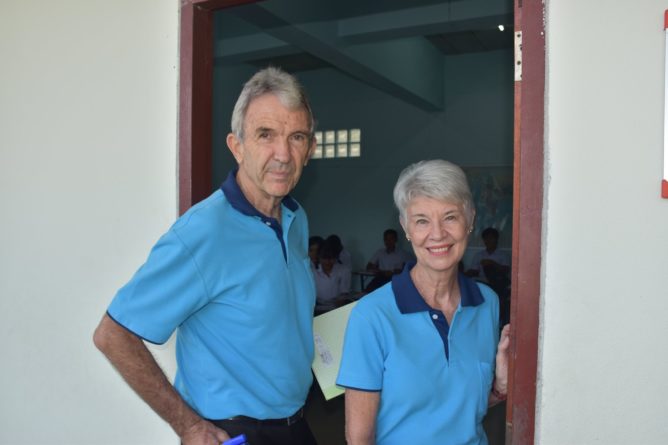Sue and Glenn Roff were a Marist Volunteer Couple, both experienced teachers in Australia, who volunteered in 2019 – 2020. They supported the Burmese Migrant Secondary Programme, Australian Catholic University Online Diploma Programme, and the late afternoon Intermediate English Programme. Here is their reflection after they returned to Australia March 2020.
 When we reflect on Ranong so many things come to mind: Markets. Smiles. Motor bikes. Cars. Dogs. Heat. Smells. Families on bikes. Rubbish. Small homes jammed together. Spotless homes. Great coffee. Beaut restaurants. Festivals. No bartering. Fish! Large supermarkets. Nothing is as it seems sometimes (language barrier). Rain. Temples. Hot springs. Shopping. Noise. Bird buildings. Songtels (small buses)… and then there’s the Marist School, the Burmese community, the raison d’etre .
When we reflect on Ranong so many things come to mind: Markets. Smiles. Motor bikes. Cars. Dogs. Heat. Smells. Families on bikes. Rubbish. Small homes jammed together. Spotless homes. Great coffee. Beaut restaurants. Festivals. No bartering. Fish! Large supermarkets. Nothing is as it seems sometimes (language barrier). Rain. Temples. Hot springs. Shopping. Noise. Bird buildings. Songtels (small buses)… and then there’s the Marist School, the Burmese community, the raison d’etre .
Perhaps some volunteers think they’re going to Ranong to “save” the school – that is far from being required. Marist Asia Foundation is a thriving, extremely well run organization with a dedicated staff in place.
The reason Sue and I ultimately volunteered was because of personal contact with Fr Frank, the Director of Marist Asia Foundation. We chatted with him over lunch about the nature and extent of this Marist outreach. We followed up with the viewing of some powerpoint images and a question and answer session.
We went to help make a difference in a Marist Mission. There was a degree of humility in our offering of selves in that neither of us had actually taught in a classroom for a decade, yet, reconnecting was very straight forward. The teaching program / resources are well based and systematic.
We also had a feeling that if we were going to commit for 12 months we needed to have some knowledge about some important questions: What was the context? What was the MAF team like? What was it like to live in Ranong? What were the teaching expectations? What resources were at the school to support teaching?
We opted for 12 months which, in retrospect, was the optimal time commitment. In reality, it took us 4-6 weeks to get a confident sense of standards, resources and professional flexibilities. The idea of a 3 month contract is a nonsense.
We would highly recommend the full school year (May – March) because in that time you get to appreciate the social context of the migrant community, and get to know both staff and students by name and personality. You also enjoy the experience of all the festivals and celebrations over a full year. 12 months enabled us to gain confidence in accessing the wonderful, less promoted tourist spots / coffee houses and restaurants in Ranong. When we left to return home it felt like we were saying ‘goodbye’ to old friends throughout Ranong.
 We felt a strong sense of satisfaction in our sustained commitment. It was certainly one of the most absorbing, stimulating and educationally connecting experiences in our professional lives.
We felt a strong sense of satisfaction in our sustained commitment. It was certainly one of the most absorbing, stimulating and educationally connecting experiences in our professional lives.
There are 150 students of school age (11-16). Courses in post school English lead into an on-line university course in Liberal Arts; as well, young teachers are enrolled in a Teaching and Learning course.
What is palpable and literally shines through the faces of all present is a passion and gratitude for education. Discipline problems are almost non-existent, although you still have to allow for the fact that you are teaching TEENAGERS.
Volunteers bring another experience to MAF; they complement the number of staff required to teach across the all the programmes. Each Volunteer is positioned according to individual skills and experience, and is supported every step of the way with regard to familiarisation in the school and in the town, with visa updates, with generous inclusion in the Marist Community.
Which brings us to … the Marist Community . In our time we saw 3 good men come and go for varying lengths of stay, moving on to different callings. As well, Fr Frank and Fr Larry were constants. Both welcoming, warm and intelligent men.
 The Volunteer Apartments we lived in were also with Sisters Margaret and Annie, Head Teacher Katie. Diverse characters. Interesting and fun discussions. Caring people. There are two standing invitations. On Wednesdays … Mass in the intimate chapel, followed by dinner together. On Fridays … TGIF drinks and dinner. Family. These moments at the Marist Community House also included Toby and his wife Sun Sun. Family.
The Volunteer Apartments we lived in were also with Sisters Margaret and Annie, Head Teacher Katie. Diverse characters. Interesting and fun discussions. Caring people. There are two standing invitations. On Wednesdays … Mass in the intimate chapel, followed by dinner together. On Fridays … TGIF drinks and dinner. Family. These moments at the Marist Community House also included Toby and his wife Sun Sun. Family.
The Volunteer Apartment offered to volunteers is unadorned yet functional. It doesn’t take long to adjust to no air conditioning and no hot water. In fact, one develops a renewed appreciation of the effectiveness of the humble fan. The toilet, in our experience, was a tad ‘unpredictable’ but, with a refrigerator, microwave and reliable electricity, everything was ok. There were also a number of options regarding the exercise nearby such as a gym and swimming pool which we enjoyed.
It helped to have a 7 Eleven within walking distance for milk, yoghurt and bread and there were good choices for eating places close by. One has to get used to hard cement floors in the flat and surreptitious use of thongs/sandals and other cushioned footwear compensated. More than anything else, the flat was home and always an appealing retreat despite the paucity of A.V. entertainment options.
There are some wonderful cultures on display at school in the everyday. The students thoroughly enjoy ‘play time’ and organize their own games. They don’t need officials as they self referee without incident and they don’t seem to keep score – the playing being the joy, the score being quite peripheral.
We never tired of the friendly greetings from the students, the big smiles and the underlying respect. If one loves the students (and they are easy to love) then the visiting teacher will have that returned in spades. Smiling is the universal language beyond learning some basic Thai/Burmese phrases. Both hold one in good stead.
Less experienced teachers could stick to the program and there are sufficient tasks and activities to engage the students meaningfully. Keeping a close eye on the program is important given the place of the examination week three times a year and the desirability of referencing performance. We believe being an experienced teacher is of benefit. Yet, if an unqualified volunteer was relational, humble, organized and creative, then one could thrive and enjoy teaching in this unique environment.
The notion of teaching outside one’s area of specialization is not a large issue given the systematic nature of the program and the resources. The reality is also that you are basically teaching at a primary and / or middle school level. There exists a vibrant learning community amongst staff that is quite uplifting beyond the support one can expect from the Coordinator of BMSP (Burmese Migrant Schools Program).
MAF provides the accommodation, electricity / water and a motorbike . We loved the 125cc Honda that would take both of us to and from school as well as to the giant stores for supplies. The traffic is a tad unpredictable but one can and should employ defensive driving strategies and that worked for us. The capacity to go for a cup of coffee during the day when there was a gap in the timetable was a life saver. And there are a number of excellent coffee houses. The bus system, we thought, was brilliant. Regular and low cost (75c a trip anywhere) as well as providing an opportunity to rub shoulders with generally very friendly locals.
It does get humid in Ranong especially in April / May / June and one does, especially in those months, live with a film of sweat. Yet, it was manageable. The fans in the flats were lifesavers and were utilized over the whole year to good effect.
We don’t see age as being an issue. We were 70 and 69 respectively. Positivity and belief in the goodness of the project were far more important qualities.
